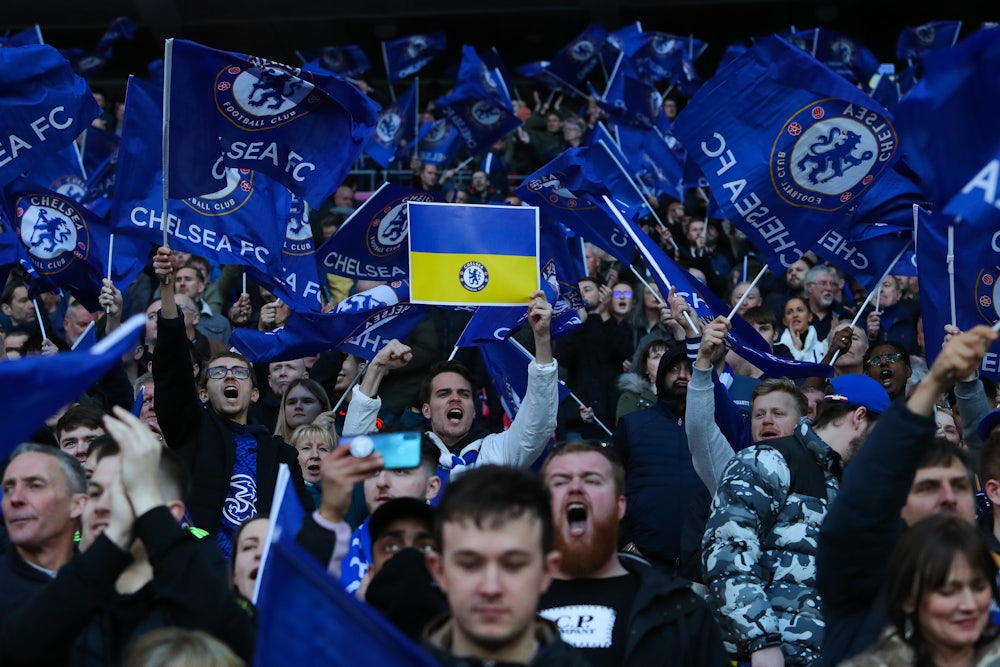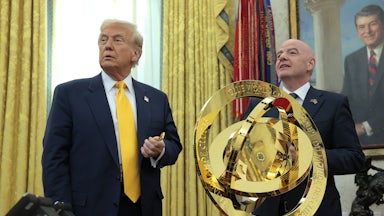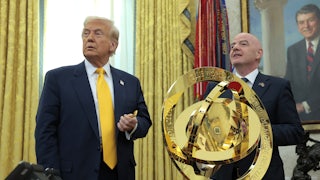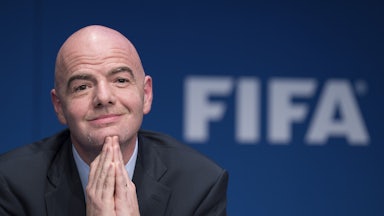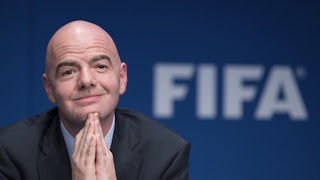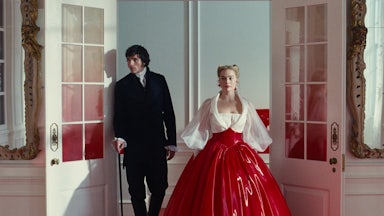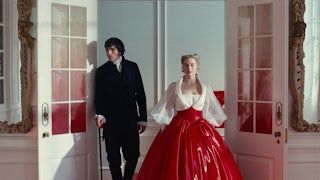Not so long ago, Chelsea Football Club’s biggest problem was that the team’s marquee addition, striker Romelu Lukaku, who was acquired from Inter Milan for $135 million over the summer, hadn’t quite panned out. Lukaku, who plays a bit like Michael Owen if Owen was also built like a tank, was something of an odd fit in manager Thomas Tuchel’s system and had begun to publicly pine for a move back to Italy. The Chelsea boss responded by benching him; it could be argued that, as good as Lukaku is, the team is better off with Kai Havertz, a haunted Victorian doll, at the tip of the spear.
Lukaku joined fellow misfit Timo Werner (brought on for $66 million two years ago) as a talisman of the club’s massive spending—and its lack of return on investment. But Chelsea’s profligate ways don’t matter: The club can drop colossal sums on players who don’t quite fit because its owner, the Russian oligarch Roman Abramovich, loves writing gigantic checks. Spending money is what Abramovich does, and spending money gets results: five Premier League titles, two Champions League trophies, and, most recently, a Club World Cup. If Lukaku didn’t work out, c’est la vie—there’s always money to splash around.
Abramovich was one of the more fabulously wealthy people in the already plutocratic club of sports franchise owners. And he was widely known to have wink-wink-nudge-nudge connections to Vladimir Putin—though he has always denied that close connection with Russia’s autocratic leader. Abramovich was rumored to have bought Chelsea as an experiment in sportswashing, the process by which corrupt and oppressive nations launder their reputations via success in sports.
That experiment worked: An outlier in the sports world when he acquired the club, Abramovich is, 19 years later, part of the establishment—a figure at the vanguard of seismic shifts in international sports. Sportswashing is now very much the norm. Since he bought Chelsea in 2003, the Premier League has become more and more in thrall to owners like him. Gaudy spending is the norm. The United Arab Emirates has a team, and so does Saudi Arabia—though the Premier League may pretend otherwise.
Abramovich has hardly been allowed even to watch his team play in England, thanks to visa problems brought on in part by his connections to the Kremlin. And yet even his absence from the scene can’t diminish his presence. Like it or not, Chelsea’s owner seemed like he would never go away. But now, going away is exactly what he plans to do. And soccer may, once again, never be the same.
Abramovich’s recent decisions—first to put the stewardship of Chelsea in the hands of the team’s charitable foundation, then to put the team up for sale (and promising to send the proceeds from that sale, whatever that means, to the victims of the war in Ukraine, whoever they are)—were almost certainly catalyzed by the way Russia’s illegal invasion of Ukraine put his ties to Putin in the spotlight. Abramovich tried to distance himself from the invasion, but it quickly became clear that his assets in the United Kingdom—very much including Chelsea F.C.—were at grave risk from sanctions-minded Western governments. Just like that, the tenure of the Premier League’s most transformative owner was coming to an end.
His exit also marks a strange moment in the sport’s sputtering moral development. The last year has been a time of tumult and brinkmanship for European soccer. Last April, 12 of the richest teams in Europe attempted to create a breakaway “Super League” that would undo the sport’s promotion and relegation structure and leave the continent’s poorer teams eating their dust. A funny thing happened on the way to the big payday, however: The Super League was met with phenomenal resistance—protests across Europe broke out, including a pitch invasion at Manchester United that led to the postponement of a game. This latest plutocratic scheme was abandoned as hastily as it was conceived. The Euros, held a year late because of Covid-19, were marked by players protesting against racial injustice by taking the knee before kickoff. And now fans have joined a new protest wave, this time against Russia’s invasion of Ukraine. It would seem that a long-belated reckoning with the sport’s coziness with dictators, foreign powers, and shady figures who seek to use it for P.R. may be in the wind.
Is such a reckoning at hand? It’s certainly true that players are more empowered than ever and increasingly see their positions as means for drawing attention to and, in some cases, redressing social ills. Fans have made their voices heard through the power of organizing and social media, as the Super League debacle shows. Abramovich’s exit was likely brought about by political and economic necessity—he can either sell his assets or have them frozen or possible seized. And yet it, too, shows the sport lurching, at least in this instance, in a more righteous direction.
It’s too early to tell if further reforms are in the offing. While there were protests against the invasion of Ukraine at Premier League pitches across the country, Chelsea supporters chanted Abramovich’s name instead of calling for peace. Newcastle United, recently purchased by Saudi Arabia’s sovereign wealth fund earlier this year, has put its new owner’s ill-gotten money to good use: The team has clawed its way out of certain relegation with an extraordinary run of form that has fans more forgiving of where the money is coming from.
During the Manchester derby, the biannual clash between Manchester’s two best teams, City and United, there were advertisements everywhere for Manchester City’s new non-fungible token. Yet there have only been occasional awkward mentions of the fact that City is owned by the UAE; and no one, as far as I can recall, has brought up the horrific war in Yemen, supported by the Saudis and the UAE. Advertisements for gambling are absolutely everywhere—on jerseys, on pitch sides, on television during halftime. There is little movement on any of these issues. While Abramovich is perhaps the most influential figure in the sport’s recent history, what has followed in his wake is literal autocratic nations owning teams. Abramovich himself might end up ceding his team to the Ricketts family—deep-pocketed Republican donors who’ve padded the war chests of lawmakers who voted to overturn the U.S. election. The more things may change, the more they threaten to stay the same.
For European soccer, this a moment of heightening contradictions. People are more aware of the deleterious influence of oligarch owners; there is a push among fans to move the sport past its ugly racist history; and Abramovich’s departure suggests that it is possible to pull out crooked owners even when they seem more entrenched than ever. But money still talks, and the hunt for more and more of it—more advertising money, more sponsors, richer owners who can splash massive sums of cash in search of trophies—continues to undercut the game. The first step in solving a problem, though, is acknowledging its existence, and there’s no denying it now.
